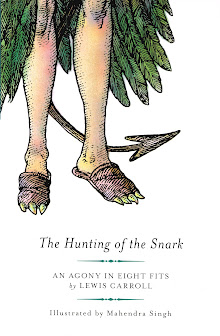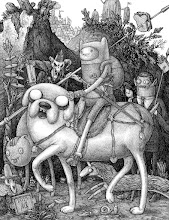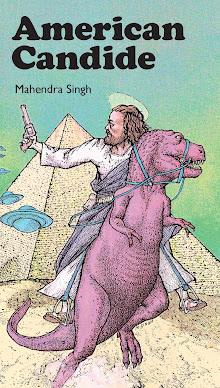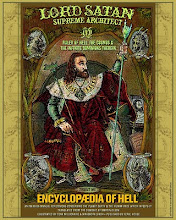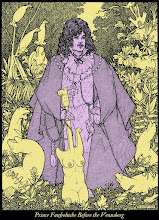Our Hunting of the Snark resumes its Jubjubian subplot for yet another
stanzel; Lewis Carroll regales us here with a spirited description of a
Jubjub being tortured by a variety of methods whose diabolical ingenuity
and inventive discomfort seem uncomfortably redolent of an impromptu
herd of schoolboys possessing the usual cretinous surplus of high
spirits and moral pygmyism.
Carroll’s closest associate, C.L.
Dodgson, would have been quite familiar with such goings-on, both as
grim memories of his own public-schooling at Rugby and more to the
point, as part of his quotidian duties as a maths tutor at Christ
Church, where we can have little doubt that the vast majority of his
students possessed a similar burning enthusiasm to make things hot for
all creatures great and small.
This implicit connection twixt
torture and mathematics must have troubled Dodgson’s gentle soul; no
doubt he shared his unease with the more worldly Carroll, who then
incorporated all of the above into this snappy bit of verse which we are
chewing over right now.
In his Annotated Snark, Martin
Gardner briefly discussed Prof. John Leech’s observations upon the
mathematical implications of this stanza. Leech noted that by
substituting locuses (or loci) for locusts, and tape measure for tape,
one is then provided with the rudimentary instructions for the sawing
and gluing together of the various wooden rods necessary for the
skeletal framework of a regular polyhedron.
One can have little
doubt that these instructions for the construction of a geometric solid
would have provided Dodgson’s students with some considerable
discomfort! From their 19th-century British discomfort they would have
slipped, inevitably, into the very graphic slough of a fullblown 16th-century German melancholia, with all its attendant polyhedronal tortures!
Huzzah
for the symmetrical mathematical-moral shape of things in our cozy
world of boiled and salted Jubjubs-cum-schoolboys, ‘tis all very well
thought out, Messers Carroll and Dodgson! The morally high-minded reader
can chuckle appreciatively at all this, the rest of you just rattle
your jewelry in a passing gust of old-fashioned schadenfreude.
NB. I must draw your attention, my dear Watson, to the curious incident of the dog barking at the moon. It is a Catalonian, 20th-century dog prone to bouts of selenic melancolia originating from its anachronistic exile to Nuremberg.
If you're read this far, then you deserve to know that my publisher, Rosarium Publishing, is running an indiegogo campaign to raise funds to continue their expansion … Rosarium specializes in books by and about minorities, books which offer stories and viewpoints which few other publishers take on. If diversity in publishing means something to you, check 'em out, or at least spread the word … http://bit.ly/rosariumpub
Monday, April 25, 2016
Monday, April 18, 2016
Eat, Drink, Prey!
In lieu of slandering Lewis Carroll here's a delicious, kitchen-tested recipe for curried Snark … if your butcher doesn't stock Snark, you can substitute beef, lamb or goat. Indian cooking is notoriously time-consuming but I promise you that this recipe is both foolproof and tastes authentic.
Genuine Assamese Snark Curry
Mix the following together:
• 1 kilo of Snark meat, cubed (if no Snark is to be had, use beef, goat or lamb, preferably with bones)
• 6 medium onions, minced
• small head of garlic, minced
• an inch of fresh ginger, grated
• tablespoon of turmeric
• one cinnamon stick
• one cup of oil
• tablespoon of salt
• a sufficient amount of genuinely hot green chilis, slit
• tablespoon of ground cumin, a tablespoon of ground coriander and a tablespoon of garam masala
Mix and let sit overnight. Cook on low heat, with the lid on and stirring occasionally for 30 minutes. Add one cup of water, bring to boil, and then reduce heat to a simmer and cook for about 90 minutes or until meat is tender. The curry should finish up with a thick gravy, not at all runny. If beef, lamb or goat meat was used, serve with rice or naan, vegetables and dal.
However, if you did use Snark, then might I suggest that you top off this culinary fiesta by sending a few thank-you rupees to my publisher, Rosarium, who is having an Indiegogo campaign to finance the extrication of their books from the clutches of a sleazy distributor (long, depressing story).
Rosarium publishes fiction and comix by minority authors with minority viewpoints (the combination is rarer than you might think), heck, they're even publishing my novel, American Candide, (also delayed by distributor but should be out May 1, latest) which is proof positive that Rosarium does what most publishers only talk about: publish books to expand people's thinking instead of shutting it down.
There is a reason why the political landscape is so dismal of late and it's not an accident … suppressing voices and stories under the guise of commercial considerations has paid off handsomely for The Man. So if you have a few spare bucks and care about art and politics and literature, send 'em to Rosarium. They won't waste it.
Thursday, April 14, 2016
American Candide …

American Candide
by Mahendra Singh (Rosarium, 2016, ISBN 978-0996769211)
200 pgs., 31 illustrations by the author
NB. Should be available on Amazon-USA by May 1, latest … the distributor is being very naughty.
Voltaire's most famous creation, Candide, rebooted for the better-than-best of all possible worlds, 21st-century America! From the slums of Africa to the McMansions of suburbia, the human condition wreaks havoc upon Candide and his posse as they search for an American Dream being held against its will in an undisclosed location. College-boy sissies will call it a Juvenalian satire upon America's penchant for mindless optimism and casual racism but American Candide calls it "rage against the rage, Voltaire-dude!"
Amazon USA
Amazon UK
Rosarium
Indiebound.org (consortium of independent bookstores)
Alibris
Amazon Italia
Amazon Deutschland
Monday, April 4, 2016
Bohemian Snark Rhapsody
“But it knows any friend it has met once before:
It never will look at a bribe:
And in charity-meetings it stands at the door,
And collects — though it does not subscribe.
No, your eyes are not deceiving you, this is not double vision but rather a mea culpa of sorts! Lewis Carroll always warned us not to bring home any Snarks we might find on the street and this applies double-plusly to any Snarks we might find on the internet, present company excluded, of course.
What brings all this to mind is the scandalous Case of the Missing Bribe, an affaire snarque which was first brought to my attention by the eminent Czech poet and Snark translator, Václav Z. J. Pinkava. It was he, who in discussing with me the above stanza regarding the Jubjub’s sordid personal habits, first detected the spurious substitution of the word bride with the word bribe in most internet texts. I'll watson Václav’s holmes thus …
"In the text I first based my translation upon, some years ago - the second b of bribe had become its mirror image, bride. It serves me right for working in IT, I should not have relied on electronic sources. I had also used Gutenberg, in 2005, so the Origin of Speciousness is now lucidly clear. The consequences of such a tiny but undetected 'program bug' are impressive. Snarkologists might find it curious that this shows up in the phrase "it never will look at a bribe" — nobody did look!"
Both Václav and I had run afoul of Gutenberg.org's tainted source copy! Shocking isn't it, dear reader, to discover that a certain someone is type-setting his raw copy from an internet site! Alas, I had already misdrawn the soiled stanza with its sordid Bride, the results of which you see above on the left. Fortunately, Václav is not only a poet, but a brainworker too, and his fertile mind was teeming with a scintillating maelstrom of myriad illustrative remedies à la Hedly Lamarr!
"Anyway, I may have a solution for you — or at least a talkaround … the Bride-as-Bribe is of course a theme reminiscent of classical Knight and Dragon stories, where the King offers his only daughter as a draconian bride-bribe to save the royal city from ruin. Rather a Grimm prospect. Tom Tower (the Christ Church background of the above drawings) looks rather like a hidden dragon to me, in your picture, with the gate as the mouth and the windows above as the eyes.
The b-d transform is, as hereto indicated, reminiscent of the two "eye" Tom Tower windows, with a bit of buttressing masonry as the uprights. Not unnaturally, then, given St George as the English patron saint, that this should be an undercurrent in any truly English literary endeavour. And, after all, on the blank part of old maps the inscription was either Hic Sunt Leones, or Hic Sunt Dracones, and so the brave Bellman has taken his crew not only into Snark country, but into Lion and Dragon country, too, just by using a blank map.
The Jubjub bird is, like most birds, not a creature of the KNight and so is much too unchivalrous to pay attention to any brides-as-bribes, lest the respective dragon-groom challenge the interloper to a fight. If Miguel de Cervantes made Don Quixote mistake windmills for Giants, then Lewis Carroll's opiated view of Tom Tower as a dragon is quite acceptable to me."
After ruminating upon Václav's advice, I remedied the situation with a corrected drawing. With this hasty addition of a large and angry honeybee, the Bride had Bee-come a Bribe and all was well again — for now, at least!

For me, the entire episode was a painful reminder of the subtle dangers lurking in even the most innocuous Carrollian verse (and the necessity of actually reading what I’m drawing, eh?). However, in further correspondence with Václav, I discovered that his own Czech translation had also run afoul of various linguistic sandbanks, which he had navigated with some considerable panache …
"Czech’s visual compactness is a side effect of diacritical marks, invented by Jan Hus, the Protestant martyr who was burnt as a heretic in Constance — albeit not for his orthography. This diacritical scheme is a great idea, it makes Czech far shorter to look at than Polish, a related language. However, the alphabet has a Carrollian 42 letters, including one dipthong 'ch', pronounced like the word Loch.
I have indeed maintained and in fact in some places enhanced the eccentricity of the text, in Carrolian style. This has led to no end of controversy. Czechs, like the French, have an institution to guard purity of language, and they are averse to anyone taking liberties, such as putting in one or two portmanteau words when the rhythmic straightjacket got too tight.
Anyway, let those Czech translators who come after me make do with the plainer versification they long for. It is often annoyingly inescapable to me, when I read Carroll's seemingly plain-English Snark, how he plays with multiple meanings in simple words (or at least I think he does). For example, in the Second Fit — "Other maps are such shapes, with their islands and capes!" — makes me think of a personified Map wearing a cape! Another example of a bit of fun; in the Barrister's dream, I took a slight liberty with the translation of:
"The fact of Desertion I will not dispute;
But its guilt, as I trust, is removed
(So far as relates to the costs of this suit)
By the Alibi which has been proved."
It occurred to me that an Alibi literally means that the accused was somewhere else at the time, which, if one is being accused of desertion, can be interesting, if negated. So I translated this partly to say that the Alibi is proven by there being none, i.e. the pig was not somewhere else. As to the cost of the "suit", I hope there was no "gilt" implied; well at least it has been removed, and especially so in translation.
On the repeating mantra "They sought it with, etc.,", I had a great opportunity to use a double meaning in Czech, because "mydlit" (to soap) someone is an idiom for beating them up, for reigning blows upon them mercilessly; so I left out the smiles part and emphasized the soap, literally: "(they) confounded it with the way soap soaps/beats up." It has a nice euphony and alliteration about it in the Czech line. There is also an idiom to soap someone's stairs, i.e., to assist their downfall.
I initially surmised that I had to be very free with the translation when it came to the Snark's fondness for bathing machines, and their adding to the beauty of scenes, as no Czech reader would have a clue what a Victorian bathing machine is. No coastline here! So I took another angle on that, mentioning showers and (car-style) wash-machines, and the adding to the beauty of scenes being open to doubt because the view is cleaner but also drop-speckled. In the end I found a way of translating it as "wheeled bathing cabins" and left it up to the reader to research what they were. It seems to me that the assertion at the very beginning of the poem, "Just the place for a Snark", is best explained by envisaging numerous bathing machines liberally perched upon chasms and crags!
In Czech it is impossible to maintain all the tradesmen starting on B, or any one letter, without changing them. Incidentally, why is everyone convinced they had names beginning with B, when they are descriptions, and one in particular very oblique — the Bonnet Maker?
One of my greatest annoyances was how many Czechs have been led astray by their clichéd schooling, which mentions the Snark in the 3rd grade despite there not being a Czech translation until now. Accordingly, they consider the Snark to be predominantly shark-like, and so they wanted it translated into some Czech soundalike (czech for shark being Žralok pronounced zhrullock). I want the Snark to remain a Snark — I just added an accent on the á. I do rather wish Carroll had named him Xnark, though."
I do hope that you've have enjoyed this lengthy but detailed exposé into the hitherto concealed inner workings of the international Snark trade, both visual and linguistic. Sure, there’s plenty of glamour and gorgeous women and fast cars and forks and hope and all that but that’s 19th century British Nonsense poetry for you, isn’t it? It will all end in tears anyway …
___________
NB. Václav is a fine poet as well as translator and his verse is worth reading, as is his father's. Václav crafts his words with hope and care, as befits a truly talented and steadfast member of the Fellowship of the Snark! Bibliophiliac Snarkniks (and you know who you are) can find his Czech Snark readily available here.
It never will look at a bribe:
And in charity-meetings it stands at the door,
And collects — though it does not subscribe.
No, your eyes are not deceiving you, this is not double vision but rather a mea culpa of sorts! Lewis Carroll always warned us not to bring home any Snarks we might find on the street and this applies double-plusly to any Snarks we might find on the internet, present company excluded, of course.
What brings all this to mind is the scandalous Case of the Missing Bribe, an affaire snarque which was first brought to my attention by the eminent Czech poet and Snark translator, Václav Z. J. Pinkava. It was he, who in discussing with me the above stanza regarding the Jubjub’s sordid personal habits, first detected the spurious substitution of the word bride with the word bribe in most internet texts. I'll watson Václav’s holmes thus …
"In the text I first based my translation upon, some years ago - the second b of bribe had become its mirror image, bride. It serves me right for working in IT, I should not have relied on electronic sources. I had also used Gutenberg, in 2005, so the Origin of Speciousness is now lucidly clear. The consequences of such a tiny but undetected 'program bug' are impressive. Snarkologists might find it curious that this shows up in the phrase "it never will look at a bribe" — nobody did look!"
Both Václav and I had run afoul of Gutenberg.org's tainted source copy! Shocking isn't it, dear reader, to discover that a certain someone is type-setting his raw copy from an internet site! Alas, I had already misdrawn the soiled stanza with its sordid Bride, the results of which you see above on the left. Fortunately, Václav is not only a poet, but a brainworker too, and his fertile mind was teeming with a scintillating maelstrom of myriad illustrative remedies à la Hedly Lamarr!
"Anyway, I may have a solution for you — or at least a talkaround … the Bride-as-Bribe is of course a theme reminiscent of classical Knight and Dragon stories, where the King offers his only daughter as a draconian bride-bribe to save the royal city from ruin. Rather a Grimm prospect. Tom Tower (the Christ Church background of the above drawings) looks rather like a hidden dragon to me, in your picture, with the gate as the mouth and the windows above as the eyes.
The b-d transform is, as hereto indicated, reminiscent of the two "eye" Tom Tower windows, with a bit of buttressing masonry as the uprights. Not unnaturally, then, given St George as the English patron saint, that this should be an undercurrent in any truly English literary endeavour. And, after all, on the blank part of old maps the inscription was either Hic Sunt Leones, or Hic Sunt Dracones, and so the brave Bellman has taken his crew not only into Snark country, but into Lion and Dragon country, too, just by using a blank map.
The Jubjub bird is, like most birds, not a creature of the KNight and so is much too unchivalrous to pay attention to any brides-as-bribes, lest the respective dragon-groom challenge the interloper to a fight. If Miguel de Cervantes made Don Quixote mistake windmills for Giants, then Lewis Carroll's opiated view of Tom Tower as a dragon is quite acceptable to me."
After ruminating upon Václav's advice, I remedied the situation with a corrected drawing. With this hasty addition of a large and angry honeybee, the Bride had Bee-come a Bribe and all was well again — for now, at least!

For me, the entire episode was a painful reminder of the subtle dangers lurking in even the most innocuous Carrollian verse (and the necessity of actually reading what I’m drawing, eh?). However, in further correspondence with Václav, I discovered that his own Czech translation had also run afoul of various linguistic sandbanks, which he had navigated with some considerable panache …
"Czech’s visual compactness is a side effect of diacritical marks, invented by Jan Hus, the Protestant martyr who was burnt as a heretic in Constance — albeit not for his orthography. This diacritical scheme is a great idea, it makes Czech far shorter to look at than Polish, a related language. However, the alphabet has a Carrollian 42 letters, including one dipthong 'ch', pronounced like the word Loch.
I have indeed maintained and in fact in some places enhanced the eccentricity of the text, in Carrolian style. This has led to no end of controversy. Czechs, like the French, have an institution to guard purity of language, and they are averse to anyone taking liberties, such as putting in one or two portmanteau words when the rhythmic straightjacket got too tight.
Anyway, let those Czech translators who come after me make do with the plainer versification they long for. It is often annoyingly inescapable to me, when I read Carroll's seemingly plain-English Snark, how he plays with multiple meanings in simple words (or at least I think he does). For example, in the Second Fit — "Other maps are such shapes, with their islands and capes!" — makes me think of a personified Map wearing a cape! Another example of a bit of fun; in the Barrister's dream, I took a slight liberty with the translation of:
"The fact of Desertion I will not dispute;
But its guilt, as I trust, is removed
(So far as relates to the costs of this suit)
By the Alibi which has been proved."
It occurred to me that an Alibi literally means that the accused was somewhere else at the time, which, if one is being accused of desertion, can be interesting, if negated. So I translated this partly to say that the Alibi is proven by there being none, i.e. the pig was not somewhere else. As to the cost of the "suit", I hope there was no "gilt" implied; well at least it has been removed, and especially so in translation.
On the repeating mantra "They sought it with, etc.,", I had a great opportunity to use a double meaning in Czech, because "mydlit" (to soap) someone is an idiom for beating them up, for reigning blows upon them mercilessly; so I left out the smiles part and emphasized the soap, literally: "(they) confounded it with the way soap soaps/beats up." It has a nice euphony and alliteration about it in the Czech line. There is also an idiom to soap someone's stairs, i.e., to assist their downfall.
I initially surmised that I had to be very free with the translation when it came to the Snark's fondness for bathing machines, and their adding to the beauty of scenes, as no Czech reader would have a clue what a Victorian bathing machine is. No coastline here! So I took another angle on that, mentioning showers and (car-style) wash-machines, and the adding to the beauty of scenes being open to doubt because the view is cleaner but also drop-speckled. In the end I found a way of translating it as "wheeled bathing cabins" and left it up to the reader to research what they were. It seems to me that the assertion at the very beginning of the poem, "Just the place for a Snark", is best explained by envisaging numerous bathing machines liberally perched upon chasms and crags!
In Czech it is impossible to maintain all the tradesmen starting on B, or any one letter, without changing them. Incidentally, why is everyone convinced they had names beginning with B, when they are descriptions, and one in particular very oblique — the Bonnet Maker?
One of my greatest annoyances was how many Czechs have been led astray by their clichéd schooling, which mentions the Snark in the 3rd grade despite there not being a Czech translation until now. Accordingly, they consider the Snark to be predominantly shark-like, and so they wanted it translated into some Czech soundalike (czech for shark being Žralok pronounced zhrullock). I want the Snark to remain a Snark — I just added an accent on the á. I do rather wish Carroll had named him Xnark, though."
I do hope that you've have enjoyed this lengthy but detailed exposé into the hitherto concealed inner workings of the international Snark trade, both visual and linguistic. Sure, there’s plenty of glamour and gorgeous women and fast cars and forks and hope and all that but that’s 19th century British Nonsense poetry for you, isn’t it? It will all end in tears anyway …
___________
NB. Václav is a fine poet as well as translator and his verse is worth reading, as is his father's. Václav crafts his words with hope and care, as befits a truly talented and steadfast member of the Fellowship of the Snark! Bibliophiliac Snarkniks (and you know who you are) can find his Czech Snark readily available here.
Subscribe to:
Posts (Atom)






